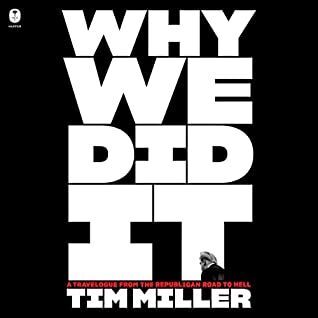Why We Did It, by Tim Miller

Opinions will be divided on this book, but I found it fascinating. Tim Miller is a moderately well-known “Never Trumper” who used to work in communications for several Republican politicians prior to the 2016 election. Miller was working for Jeb Bush when Trump won the primary, and his subsequent disgust with Trump and all that Trump represented, led Miller not only (eventually) away from the party altogether, but to a re-examination of how the party he had once supported and worked for led to the outcomes of 2016 and beyond.
Tim Miller never worked in the Trump administration, but for this book he tells the stories of lots of people who did — some who agreed to talk to him on record and some who did not. But he titles it Why We Did It rather than Why They Did It because Miller fully owns and admits to his own culpability in building the machine that courted the votes and empowered the voices of the same people who voted for Trump in 2016 and 2020 and who stormed the Capitol on January 6, 2021.
For some leftie readers, Miller’s self-examination won’t be enough to exonerate him (and I think he’d be OK with that). As a gay man working for an increasingly homophobic political party, the cognitive dissonance was already starting to get to him, but it’s valid to ask whether, if Jeb Bush had won the 2016 Republican primary, Tim Miller would still be a Republican operative. Did his growing questioning and discontent with much of his party’s direction require the catalyst of Trumpism to turn it into open rebellion, or would that have happened eventually anyway?
There’s no way to know for sure, obviously, and while Miller answers a lot of questions in this book, he doesn’t touch on that one directly. For me, as an interested Canadian who swore off my obsession with US politics after 2020 (and has mostly managed to keep distanced from it), Miller’s engaging voice, humour, and honesty were enough to draw me back in for as long as it took me to listen to this audiobook. (Worth noting that I’m using “voice” here in the metaphorical sense as this is one of those audiobooks that is narrated not by the author but by someone else. As Miller is a podcaster, his voice is quite listen-able and I don’t know why he didn’t narrate it himself as I would have enjoyed that even more, but that’s a very minor quibble).



